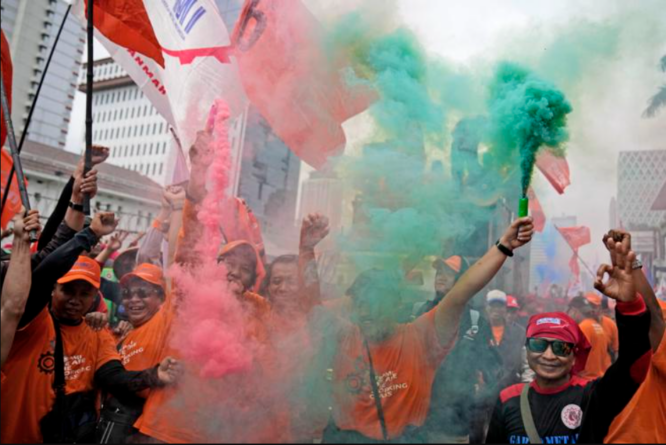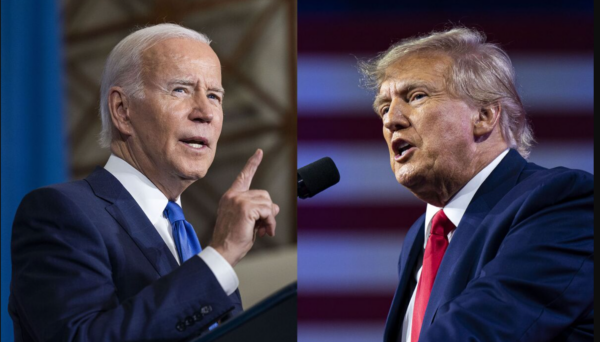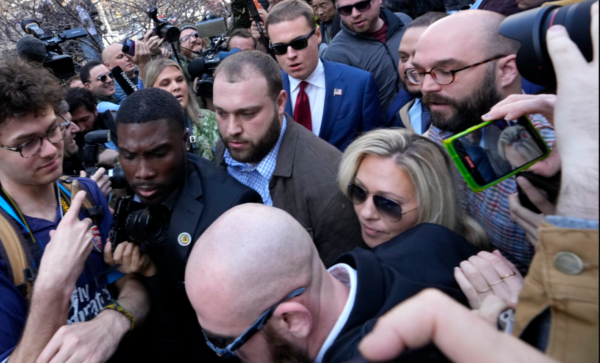Monday, May Day, was celebrated by workers and activists around the globe with rallies demanding higher wages, shorter work hours, and other improved working conditions.
Massive demonstrations are planned in France to protest President Emmanuel Macron’s recent decision to raise the retirement age from 62 to 64. Activists view the pension reform as a threat to the hard-won worker rights and social safety net of France.
The pension bill sparked France’s largest demonstrations in years, and the May 1 demonstrations are anticipated to be the largest to date.
The first of May is celebrated in many countries as a day to commemorate workers’ rights with rallies, marches, and other activities. This year’s events drew larger crowds than in the past, as COVID-19 restrictions were significantly loosened and opposition focused on how economic plans will affect employees.

May Day rallies worldwide demanded higher wages, shorter hours, and improved working conditions.
As in previous years, Turkish police prevented a group of demonstrators from reaching Taksim, Istanbul’s main square, and detained approximately a dozen protestors, according to an independent television station. Journalists attempting to film the forcible transfer of protesters into police vehicles were also pushed back or detained.
After unidentified assailants opened fire on May Day revelers at Taksim in 1977, causing a stampede, the square assumed symbolic significance for Turkey’s labor unions. Dozens were slain.
The government of President Recep Tayyip Erdogan has proclaimed Taksim off-limits to demonstrations, resulting in frequent clashes between police and protesters attempting to enter the square.
Small groups were permitted to access Taksim to lay wreaths at a nearby monument.
In South Korea, tens of thousands of people participated in various May Day rallies, which were the largest since the pandemic began in early 2020. According to organizers, each of the two major rallies in the capital, Seoul, was anticipated to attract approximately 30,000 participants.
“Everything has become more expensive except for our salaries. Increase our minimum wages!” an activist exclaimed from the podium at a rally in Seoul. “Reduce our working hours!”
A throng packed into the Gwanghwamun neighborhood in the heart of Seoul carried anti-government placards, sang songs, and listened to union leaders’ speeches. They marched through the streets later. To maintain order, the Seoul police mobilized thousands of officers.
Protesters in South Korea accused President Yoon Suk Yeol’s conservative administration of repressing certain unions in the name of reforming alleged irregularities. The government of Yoon has been advocating for labor reform, requesting more transparent accounting records from labor unions and an end to alleged illegal practices by some union members and construction workers, such as pressuring companies to hire union members or demanding kickback-like payments from them.
Thousands of labor union members, opposition lawmakers, and academics congregated in Yoyogi park in Tokyo, demanding wage increases to offset the impact of rising costs as they continue to recover from the pandemic’s devastation.
According to union leaders, government measures for remuneration increases are insufficient and lagging behind inflation. They criticized Prime Minister Fumio Kishida’s plan to double the defense budget, which necessitates tax increases in the future years, and argued that the money should be spent on welfare, social security, and enhancing the quality of life for the average citizen.

Yoshinori Yabuki, head of the Tokyo Regional Council of Trade Unions and one of the event’s organizers, said, “Let’s keep fighting as we workers unite to seek peace and democracy in Japan.”
Others chanted “Gambaro!” (Let’s do our best) prior to marching down the street.
Kishida attended a Saturday event in a park in Tokyo that brought thousands of workers, politicians, and union leaders.
“I am participating today because I want to continue the momentum toward increased salaries. The primary objective of my ‘new capitalism’ policy is to increase earnings, Kishida told the audience.
Demonstrators in Indonesia demanded that the government repeal a law that, according to them, would benefit businesses at the expense of employees and the environment.
“The Job Creation Law must be repealed in order to improve working conditions,” Sri Ajeng stated at one rally. It is only designed to benefit employers and not employees.
On the eve of May Day, feminist and LGBTQ organizations organized a “Take Back the Night” rally in Germany to protest violence against women and LGBTI individuals. Several thousand individuals participated in the march, which was largely nonviolent despite occasional clashes with police. On Monday, numerous additional demonstrations by labor unions and left-wing organizations are scheduled for Germany.
A large number of Taiwanese employees have taken to the streets to protest what they perceive to be the inadequacies of the island’s labor policies, exerting pressure on the ruling party ahead of the 2024 presidential election.
Members of labor organizations gathered in the capital, Taipei, and waved flags representing their organizations. Some medical employees clad in protective gear held placards with messages requesting subsidies, while others held banners criticizing the labor policies of President Tsai Ing-wen.
North Korea’s leading newspaper, Rodong Sinmun, published a lengthy editorial urging workers to provide greater support for leader Kim Jong Un, meet their production quotas, and enhance public welfare.
“We should become genuine socialist workers who faithfully support the ideas and leadership of the Workers’ Party’s esteemed general secretary,” the paper stated, referring to Kim by his title within the ruling Workers’ Party.
Kim has called for a stronger, self-sufficient economy to surmount pandemic-related hardships and prolonged security tensions with the United States over his nuclear program.



